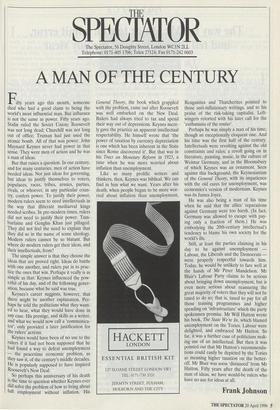SPECTATOR
The Spectator, 56 Doughty Street, London WC1N 2LL Telephone: 0171-405 1706; Telex 27124; Fax 0171-242 0603
A MAN OF THE CENTURY
Fifty years ago this month, someone died who had a good claim to being the world's most influential man. But influence is not the same as power. Fifty years ago, Stalin ruled the Soviet Union; Roosevelt was not long dead; Churchill was not long out of office; Truman had just used the atomic bomb. All of that was power. John Maynard Keynes never had power in that sense. They were men of action and he was a man of ideas.
But that raises a question. In our century, and for many centuries, men of action have needed ideas. Not just ideas for governing, but ideas to justify themselves to voters, populaces, races, tribes, armies, parties, rivals, or whoever, in any particular coun- try, confers power. To justify their power, modern rulers seem to need intellectuals in the way that illiterate mediaeval kings needed scribes. In pre-modern times, rulers did not need to justify their power. Tam- burlaine and Genghis Khan just pillaged. They did not feel the need to explain that they did so in the name of some ideology. Modern rulers cannot be so blatant. But where do modern rulers get their ideas, and their intellectuals, from?
The simple answer is that they choose the ideas that are proved right. Ideas do battle with one another, and rulers put in to prac- tice the ones that win. Perhaps it really is as simple as that: Keynes influenced the pow- erful of his day, and of the following gener- ation, because what he said was true.
Keynes's career suggests, however, that there might be another explanation. Per- haps he told the politicians what they want- ed to hear, what they would have done in any case. His prestige, and skills as a writer, and what we would now call a 'communica- tor', only provided a later justification for the rulers' actions.
Keynes would have been of no use to the rulers if it had not been supposed that he had found a way to defeat unemployment — the peacetime economic problem, as they saw it, of the century's middle decades. He is popularly supposed to have inspired Roosevelt's New Deal.
So perhaps this anniversary of his death is the time to question whether Keynes ever did solve the problem of how to bring about full employment without inflation. His General Theory, the book which grappled with the problem, came out after Roosevelt was well embarked on the New Deal. Rulers had always tried to tax and spend their way out of depressions. Keynes mere- ly gave the practice an apparent intellectual respectability. He himself wrote that 'the power of taxation by currency depreciation is one which has been inherent in the State since Rome discovered it'. But that was in his Tract on Monetary Reform in 1923, a time when he was more worried about inflation than unemployment.
Like so many prolific writers and thinkers, then, Keynes was biblical. We can find in him what we want. Years after his death, when people began to be more wor- ried about inflation than unemployment, Reaganites and Thatcherites pointed to those anti-inflationary writings, and to his praise of the risk-taking capitalist. Left- wingers retorted with his later call for the `euthanasia of the rentier'.
Perhaps he was simply a man of his time; though an exceptionally eloquent one. And his time was the first half of the century. Intellectuals were revolting against the old constraints and rules; a revolt going on in literature, painting, music, in the culture of Weimar Germany, and in the Bloomsbury of which Keynes was an ornament. Seen against this background, the Keynesianism of the General Theory, with its impatience with the old cures for unemployment, was economics's version of modernism. Keynes was its James Joyce.
He was also being a man of his time when he said that the allies' reparations against Germany were too harsh. (In fact, Germany was allowed to escape with pay- ing only a fraction of them.) He was embodying the 20th-century intellectual's tendency to blame his own society for the world's ills.
Still, at least the parties claiming in his day to be against unemployment Labour, the Liberals and the Democrats were properly respectful towards him. Today, he would be unlikely to fare well at the hands of Mr Peter Mandelson. Mr Blair's Labour Party claims to be serious about bringing down unemployment, but is even more serious about reassuring the great majority of voters that they will not be taxed to do so; that is, taxed to pay for all those training programmes and higher spending on 'infrastructure' which the party spokesmen promise. Mr Will Hutton wrote his book, The State Were In, which blamed unemployment on the Tories. Labour were delighted, and embraced Mr Hutton. So far, it was a further case of politicians mak- ing use of an intellectual. But then it was pointed out that Mr Hutton's recommenda- tions could easily be depicted by the Tories as meaning higher taxation on the better- off. Mr Blair was soon 'distanced' from Mr Hutton. Fifty years after the death of the man of ideas, we have would-be rulers who have no use for ideas at all.
Frank Johnson


































































 Previous page
Previous page